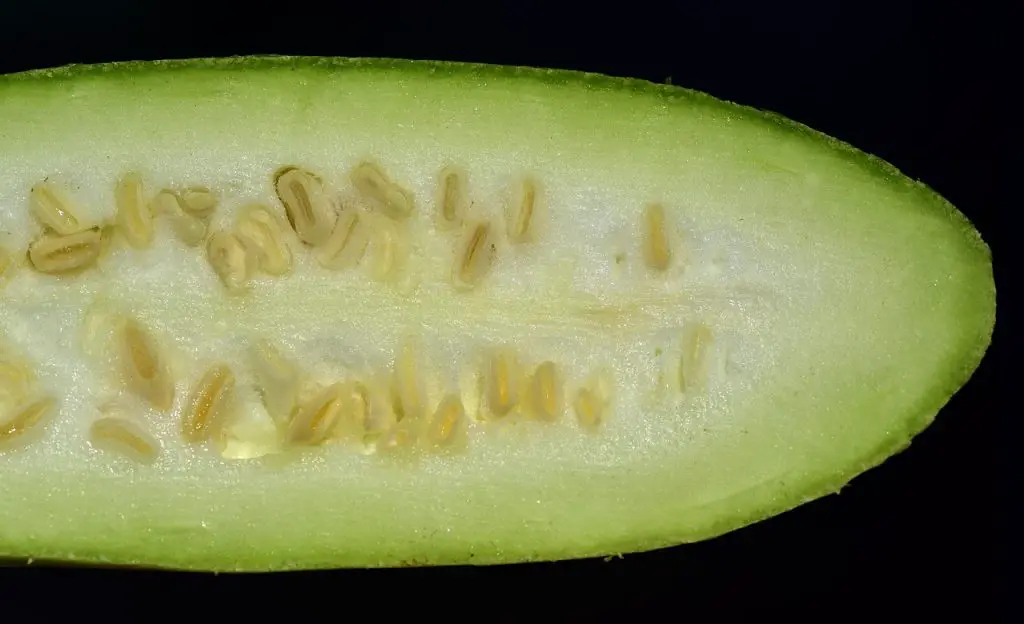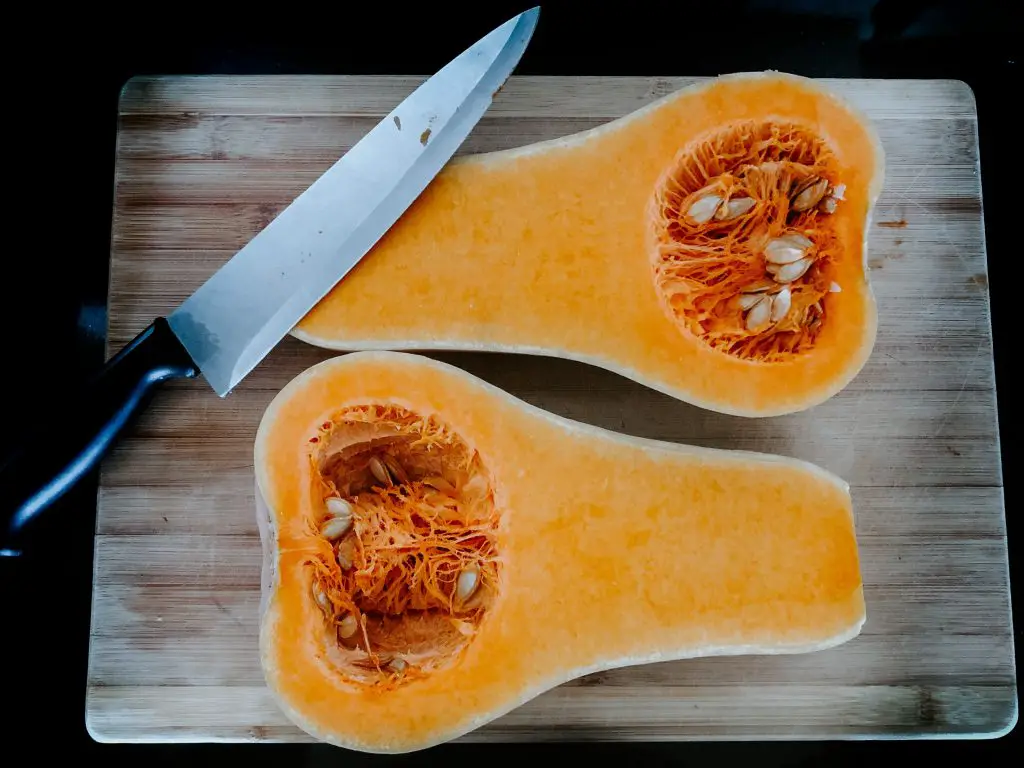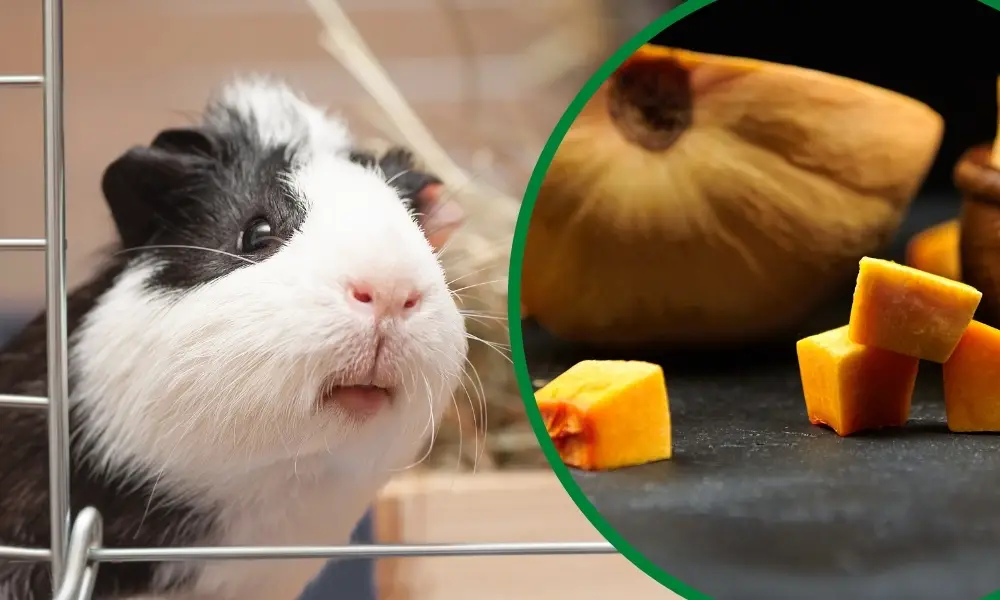Squash is not only a delicious diet but is also highly nutritious. Although, for health’s sake, it is not advisable to feed your little pets all fruits.
But, you may be wondering, can guinea pigs eat squash?
The answer is yes, your guinea pigs can eat squash. They are rich in fiber, antioxidants, vitamin A and other important nutrients that can improve cavies’ health.
Ensure you serve your tiny pets only a small squash at a time to prevent them from experiencing health problems.
While we know that squash is safe for your little pets, you may also be thinking, can guinea pigs eat all parts of the squash?
Well, you’re in the right place!
Just keep reading as I clear your doubts and inform you about the squash diet for your cavies.
Table of Contents
Can Guinea Pigs Eat the Whole Squash?
No, guinea pigs cannot eat the whole squash part because some of it is not healthy for them. And it is always advisable not to test your cavies’ reaction to diets but to first find out if they can handle it or not.
For this reason, let’s take a look at the safe and unsafe squash parts for guinea pigs:
Can Guinea Pigs Eat Squash Skin?
Yes, the squash skin is soft and therefore perfectly safe for your guinea pigs to chew and swallow. In addition, the skin is rich in fiber, vitamin A, vitamin C, and minerals that can improve your cavies’ overall health.
Simply wash the skin thoroughly before feeding your small pets with it and everything will be fine.
Can Guinea Pigs Eat Squash Seeds?

No, your guinea pigs should not eat squash seeds because they can choke on them. Gently remove all seeds from the fruit before feeding them with it to be safe.
Apart from choking hazards, the seeds can damage your guinea pigs’ small teeth.
Can Guinea Pigs Eat Squash Leaves?
Yes, guinea pigs can eat squash leaves as they are soft and tasty. Also, the leaves are rich in iron, zinc, and calcium that builds strong bones, teeth, and boosts blood circulation in guinea pigs.
But they shouldn’t eat too many squash leaves at a time to prevent overfeeding and its effect.
Nutritional Value of Squash
Naturally, the squash fruit is packed with several nutrients that your guinea pigs need to function well every day. Here are the nutrients in 100gram of squash.
| Protein | 1g |
| Vitamin A | 532ug |
| Dietary fibers | 2g |
| Fat | 0.1g |
| Carbohydrates | 11.69g |
| Thiamine | 0.1mg |
| Niacin | 1.2mg |
| Folate | 27ug |
| Calcium | 48mg |
| Vitamin E | 1.44mg |
| Zinc | 0.15mg |
| Phosphorous | 33mg |
| Manganese | 0.202mg |
| Calcium | 48mg |
| Pantothenic acid | 0.4mg |
| Riboflavin | 0.02mg |
| Beta carotene | 4226ug |
| Iron | 0.7mg |
| Vitamin C | 21mg |
| Potassium | 352mg |
| Magnesium | 34mg |
Benefits of Feeding Guinea Pigs Squash
Including squash in your guinea pigs’ diet is a smart move! These are the health benefits they’ll get from eating the fruit.
- Improves Digestion
Fiber is one of the most important nutrients in squash. It allows easy and fast digestion of food. Furthermore, it can prevent bloating and other stomach discomforts in pets.
If your guinea pigs experience indigestion all the time, consider including squash in their diets.
- Removes Free Radicals
Squash is also rich in antioxidants; compounds that eliminate free radicals from the body.
Naturally, body metabolism releases free radicals which can cause serious diseases like cancer. With diets rich in antioxidants such as squash, your guinea pigs will be free from such problems.
- Helps to Prevent Scurvy
Vitamin C is another nutrient in squash that performs different functions, including preventing scurvy.
As you know, your cavies are not able to produce the vitamin C nutrients and have to get them from external sources. And remember that scurvy is a serious disease that comes about due to a lack of vitamin C.
So, it is better to start feeding your guinea pigs fruits that are rich in vitamin C like squash from now. Prevention is cheaper and better than cure.
- Boosts Immunity
Squash is also packed with vitamin K, copper, and iron which are all useful for building guinea pigs’ immune systems.
If your tiny pets are falling sick all the time, there’s a chance their immunity is poor. Giving your cavies squash once or twice weekly can prevent these health issues
Risks of Feeding guinea Pigs Squash
Regardless of being a highly nutritious fruit, squash can harm your guinea pigs if you’re not careful. So, here are the risks to avoid when feeding your cavies the fruit:
- Digestive Problems
There’s a high chance that your guinea pigs will experience health problems if they eat too much squash.
Remember that the fruit has sugar and fibers, which when taken in moderation, will provide lots of benefits. But it can also cause diarrhea, stomach cramps, and more if your cavies eat large amounts at once.
- Urinary Problems
Calcium is a major nutrient in squash that can build strong bones and teeth in your cavies. However, too much calcium can expose your guinea pigs to the risk of bladder and kidney stones.
If you don’t take them to the vet doctor on time, the health problem can lead to kidney failure.
How to Serve Guinea Pigs Squash

Preparing squash for your guinea pigs plays a key role in the way they’ll enjoy the fruit thereby gaining health benefits from them. Also, it can prevent your tiny pets from experiencing issues like choking hazards.
Follow through these step-by-step methods on how to prepare squash for your guinea pigs to be on the safe side.
Step 1: Shop Right
As simple as this step may look, it is the most important. Always buy fresh and ripe squash only at the fruit store as it is always the best. Unripe or overripe squash can cause digestive problems like diarrhea or stomach aches in your guinea pigs.
Step 2: Rinse
Wash the squash carefully with clean water to remove all dirt, bacteria, or pesticides. Even though some fruits look clean from the outside, they may harm your cavies if you don’t wash them well.
Step 3: Cut into Pieces
Get a clean knife and cutting board, cut the squash into cube shapes, and then remove the seeds carefully. It will make your guinea pigs chew the fruit easily and also prevent choking hazards.
Step 4: Serve
After following steps 1 to 3 correctly, you’re free to feed your guinea pigs the squash fruit.
Allow the pets to eat directly from your hands because it creates a bond between you and them. Also, watch their reaction for at least 24 hours to take quick action if anything goes wrong.
Step 5: Clean
Remove all left-over squash from the cage as soon as possible to prevent bacteria from acting on them. Besides, cleaning your guinea pigs’ cage regularly contributes to their general wellness.
What Kind of Squash Can Guinea Pigs Eat?
There are different types of squash today that can benefit your cavies in many ways. Let’s take a look at the ones your guinea pigs can eat and the ones you should not feed them.
Can Guinea pigs Eat Summer Squash?
Yes, your guinea pigs can eat summer squash because they are rich in vitamin C and contain less calcium, unlike the winter squash.
Always remember that your cavies need lots of vitamin C because they cannot produce it, which means you should provide it for them.
Consider including summer squash in their diet once in a while to improve their general health.
Can Guinea Pigs Eat Raw Butternut Squash?
Yes, your guinea pigs can eat butternut squash. They are a variety of winter squash with a sweet taste and soft texture.
Besides, butternut squash contains vitamin C, fiber, Vitamin A, and other important nutrients that can help your guinea pigs grow perfectly.
However, keep in mind that butternut squash is high in oxalic acid, which can cause bladder stones in guinea pigs. This means you should feed your tiny pets only once or twice a month.
Can Guinea Pigs Have Spaghetti Squash?
Yes, you’re free to feed guinea pigs spaghetti squash once or twice weekly. They contain a moderate amount of beta-carotene, vitamin C, and other nutrients that can prevent scurvy in your guinea pigs.
Remove the skin and seeds of spaghetti squash before serving them to your guinea pigs to prevent them from choking on it.
Can Guinea Pigs Eat Acorn Squash?
Yes, acorn squash is safe for your guinea pigs to eat. The fruit is a rich source of vitamin A, vitamin C, and other important nutrients for your cavies.
Always feed your guinea pigs only a little acorn squash at a time – just like a treat.
Consider giving your tiny pets other fruits to create a balance in their nutrient intake.
What Other Fruits Can Guinea Pigs Eat?
Besides squash, there are different healthy and delicious fruits that your guinea pigs can eat. Here are some of them:
| Apple | Apricot | Banana | Strawberry | Cherries |
| Cranberries | Grapes | Kiwi fruit | Melon (All types) | Blueberries |
| Tomatoes | Papaya | Peach | Pear | Pineapple |
| Plums | Raspberry | Oranges | Radish | Watermelon |
Related Questions
Can Guinea Pigs Drink Squash Juice?
No, don’t give your guinea pigs squash juice as it will be too sweet and can cause stomach problems.
Usually, juice contains different flavors and artificial sweeteners that are not recommended for cavies to drink for health’s sake.
Consider providing just clean water for your small pets – it’s always safer.
Can Guinea Pigs Eat Yellow Squash Skin?
Yes, your guinea pigs can eat the yellow squash skin as it is thin and flavorful. Always wash off dirt from the squash skin before feeding it to your tiny pets.
Also, watch out for allergic reactions in your cavies and stop giving them the diet if you notice any unpleasant signs.
Final Thoughts
Now, we have come to the concluding part of this article but take note of a few key points before you leave.
All we’ve discussed in this article is that squash is a highly nutritious and delicious fruit for your guinea pigs. However, avoid serving your small pets squash seeds and juice as they can cause harm to them.
Finally, consider giving your cavies the diet once or twice weekly to be on the safe side. Do not forget that it is not the number of fruits you feed your pets that matters but the quality.
If you found this article helpful, don’t forget to share it with your guinea-pig lover friends!
